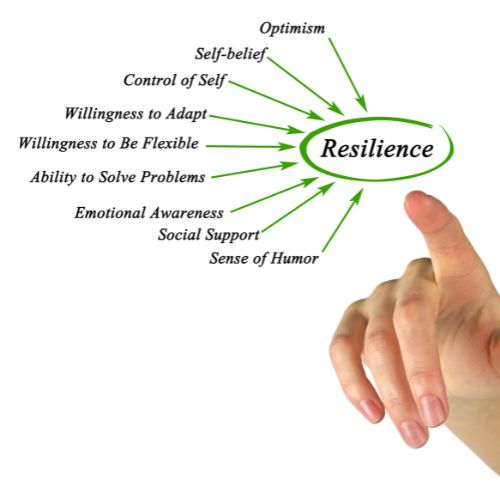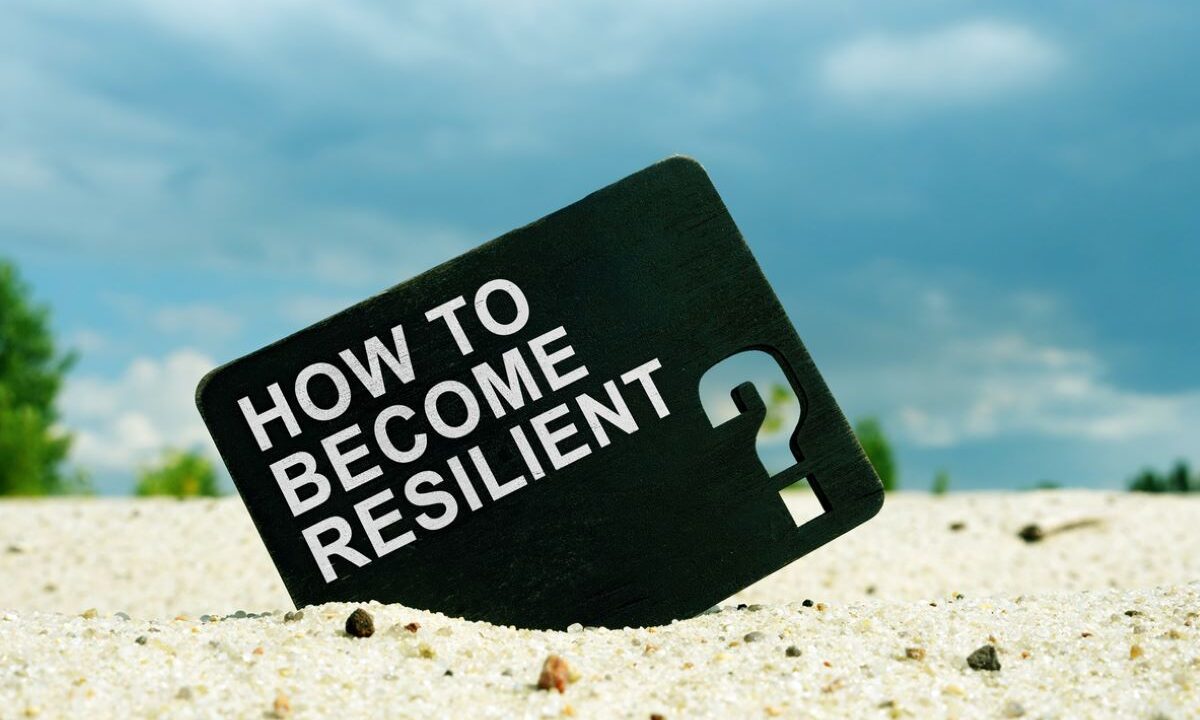Resilience is a word that gets thrown around a lot these days, but what does it really mean? At its core, resilience is the ability to bounce back from adversity.
It’s that inner strength that allows us to weather life’s storms and come out stronger on the other side. Resilience is not about avoiding challenges or pretending everything is always fine; rather, it’s about facing difficulties head-on and finding ways to overcome them.
The Art of Bouncing Back
Imagine a rubber ball being dropped on the floor. The ball doesn’t stay down; instead, it bounces back up with a determined force. That’s resilience in action.
Just like the ball, resilient individuals have the remarkable ability to spring back when life knocks them down. They possess an unwavering spirit and an unyielding determination that propels them forward even in the face of adversity.
The Power of Resilience

Resilience isn’t just some abstract conceptit has tangible impacts on our everyday lives. In fact, having resilience can make all the difference between sinking or swimming when faced with challenges. Think about it: we all encounter setbacks and hardships at some point whether it’s losing a job, experiencing heartbreak, or dealing with health issues.
In these moments of difficulty, resilience becomes our lifeline—the life jacket that keeps us afloat amidst turbulent waters. It allows us to maintain our composure and find ways to navigate through tough times without succumbing to despair or hopelessness.
Moreover, resilience doesn’t limit itself to extraordinary circumstances; its influence permeates every aspect of our lives—from personal relationships and career success to mental well-being and overall happiness. Cultivating resilience enables us to approach life with greater courage, adaptability, and optimism, ultimately leading to a more fulfilling and rewarding existence.
Understanding Resilience
Definition of resilience – bouncing back from adversity
Resilience, in its essence, can be defined as the ability to bounce back and recover from life’s challenges, setbacks, or adversities. It is the remarkable quality that allows individuals to withstand and overcome difficult circumstances with strength and perseverance.
Picture a rubber band that stretches but doesn’t break under pressure; that’s resilience in action. When we face adversity, whether it be personal loss, failure, or unexpected changes in our lives, resilience enables us to adapt and navigate through these experiences without succumbing to despair.
It goes beyond mere toughness or stoicism; rather, it involves a dynamic process of emotional regulation and cognitive flexibility. Resilient individuals possess an innate capacity to maintain a positive outlook while finding innovative solutions to problems.
Psychological and emotional aspects of resilience
Resilience isn’t solely about physical toughness; it primarily resides within the realm of psychology and emotions. It encompasses various internal processes that contribute to one’s ability to cope effectively with challenges.
Emotionally resilient individuals have developed robust psychological defense mechanisms that shield them from being overwhelmed by negative emotions during difficult times. One crucial aspect of psychological resilience is self-awareness-the ability to recognize one’s own emotions and thought patterns.
This awareness provides a solid foundation for managing stressors effectively. Resilient people are skilled at identifying their triggers while maintaining control over their responses.
Moreover, adaptability plays a significant role in emotional resilience. Being open-minded and flexible allows individuals to adjust their mindset when faced with adversity.
They can reframe negative situations into opportunities for growth rather than allowing themselves to become consumed by pessimism. Building social support networks is vital for emotional resilience.
Strong connections with loved ones provide invaluable emotional support during challenging times. They serve as sounding boards for venting frustrations while offering encouragement and perspective.
These relationships create a sense of belonging and reinforce one’s belief in their ability to overcome obstacles. Resilience is both an internal and external process that involves bouncing back from adversity.
It encompasses psychological and emotional aspects such as self-awareness, adaptability, and social support networks. Understanding these components helps individuals cultivate resilience within themselves, ultimately enhancing their ability to navigate life’s ups and downs with grace and strength.
Factors Influencing Resilience

Genetics and Biological Factors
Our ability to exhibit resilience in the face of adversity is influenced by a combination of genetic and biological factors. It may come as no surprise that some individuals seem to handle stress better than others.
This individual variance can be attributed, at least in part, to our unique genetic makeup. Research suggests that certain genes can affect how we cope with stress and traumatic experiences.
For instance, studies have identified specific gene variations associated with increased resilience. These genes influence the production of proteins that play a crucial role in regulating our body’s response to stress.
Individuals with such genetic variations may have enhanced abilities to regulate their emotions, bounce back from setbacks, and maintain a positive outlook even during challenging times. Moreover, brain chemistry plays a vital role in resilience.
Neurotransmitters like serotonin, dopamine, and norepinephrine are involved in mood regulation and emotional processing. Imbalances or dysregulation of these neurotransmitters can impact our ability to cope with stressors effectively.
Environmental Factors
While genetics provide a foundation for resilience, environmental factors also shape our ability to navigate difficult circumstances. Childhood experiences play a significant role in determining an individual’s level of resilience later in life. Studies have found that individuals who faced adversity early on but had nurturing caregivers were more likely to develop resilient traits.
Experiencing trauma or hardships during childhood does not automatically diminish resilience; rather, it depends on the availability of supportive relationships or resources for coping. Children who lack nurturing relationships or grow up in unstable environments may struggle more when facing challenges as adults due to limited exposure to healthy coping mechanisms.
Supportive relationships and social connections are crucial environmental factors that can foster resilience throughout life. Having reliable people who offer emotional support, understanding, and guidance during tough times enhances one’s capacity for bouncing back from setbacks effectively.
A strong network of friends, family, or mentors provides a buffer against stress and adversity, offering encouragement and assistance when needed. Resilience is influenced by both genetic and environmental factors.
While genetics provide a foundation for our ability to cope with stress, childhood experiences and supportive relationships play significant roles in shaping our resilience throughout life. Understanding these factors can help us appreciate the complex interplay between nature and nurture in fostering resilience.
Developing Resilience Skills

Building a Positive Mindset
When it comes to developing resilience, cultivating a positive mindset is crucial. It involves consciously shifting our focus towards optimism and self-belief, even in the face of adversity.
Optimism allows us to see setbacks as temporary and solvable challenges rather than insurmountable obstacles. By maintaining a positive outlook, we can build resilience by fostering hope and motivation.
Self-belief plays an equally vital role in developing resilience. It involves having confidence in our abilities and trusting ourselves to navigate difficult situations successfully.
Building self-belief requires acknowledging our strengths and accomplishments, no matter how small they may seem. By embracing a mindset that reinforces our worthiness and capabilities, we boost our resilience by gaining the confidence needed to face challenges head-on.
Developing a Growth Mindset
A growth mindset is another essential aspect of developing resilience skills. This mindset centers around the belief that intelligence, talents, and abilities can be developed through effort and perseverance.
Embracing a growth mindset means viewing failure as an opportunity for learning and growth rather than as evidence of inadequacy. By adopting a growth mindset, we develop an inherent curiosity that fuels our desire to learn from setbacks.
Instead of dwelling on past mistakes or feeling defeated by them, we see them as stepping stones on the path to success. This perspective allows us to adapt more readily when faced with new challenges because we know that with dedication and hard work, we can continue growing into better versions of ourselves.
Enhancing Emotional Intelligence
Resilience goes hand in hand with emotional intelligence – the ability to recognize, understand, manage, and express emotions effectively. Developing emotional intelligence equips us with valuable tools for building resilience in various aspects of life.
Recognizing emotions is the first step towards emotional intelligence. When we become aware of what we are feeling, we can better understand the impact our emotions have on our thoughts and actions.
This self-awareness enables us to manage our emotions effectively, preventing them from overwhelming us in times of stress. Developing empathy and social skills is another crucial aspect of enhancing emotional intelligence.
Empathy allows us to understand and connect with others’ emotions, fostering supportive relationships. Social skills enable effective communication and collaboration, ensuring that we can seek help when needed or offer support to those around us.
Taking Care of Physical Well-being



In the pursuit of resilience, it’s essential not to overlook the impact of physical well-being. Exercise, nutrition, and sleep play significant roles in bolstering our ability to bounce back from challenges. Regular exercise has been shown to reduce stress levels by releasing endorphins – chemicals that boost mood and promote a sense of well-being.
Engaging in physical activity also helps regulate sleep patterns, further enhancing resilience as a good night’s rest contributes to clearer thinking and improved emotional stability. Proper nutrition provides the body with the necessary nutrients for optimal functioning.
A balanced diet that includes whole foods rich in vitamins, minerals, and antioxidants supports brain health, which is vital for maintaining resilience during stressful situations. Managing stress is key to building resilience.
Adopting stress management techniques such as mindfulness meditation or engaging in relaxing hobbies can help reduce feelings of overwhelm and enhance our ability to cope with adversity effectively. By prioritizing physical well-being through exercise, nutrition, and stress management techniques, we fortify both body and mind for greater resilience in all areas of life.
Resilience in Different Areas of Life
Resilience at work
In the ever-changing landscape of the professional world, resilience is an invaluable trait that can make or break your career. Coping with workplace challenges is a skill that sets apart individuals who thrive in their jobs from those who crumble under pressure. Whether it’s a demanding project, a difficult colleague, or a tight deadline, resilient workers have the ability to stay calm and composed in the face of adversity.
When confronted with workplace challenges, resilient individuals approach them with a problem-solving mindset. They focus on finding creative solutions rather than dwelling on setbacks.
Moreover, they possess excellent adaptability skills and can quickly adjust to changes in the professional environment. Whether it’s adapting to new technologies or embracing organizational restructuring, resilient employees see change as an opportunity for personal growth rather than a threat.
Resilience in relationships
Relationships are complex webs of emotions and interactions that require resilience to withstand conflicts and setbacks. Navigating disagreements and resolving conflicts constructively is crucial for maintaining healthy relationships.
Resilient individuals have developed effective communication skills that allow them to express their thoughts and emotions assertively yet respectfully. Moreover, building healthy communication patterns is essential for fostering resilience within relationships.
Resilient individuals actively listen to others’ perspectives without becoming defensive or dismissive. They are open-minded and willing to compromise when necessary while also setting appropriate boundaries when needed.
Resilience during difficult times
Life throws curveballs our way when we least expect them – from coping with loss or grief to dealing with major life transitions such as moving cities or changing careers. During these trying times, resilience becomes our anchor amidst turbulent seas. Coping with loss or grief requires immense strength, both emotionally and mentally.
Resilient individuals acknowledge their pain but do not let it consume them. They seek support from friends, family, or professionals to navigate the grieving process while also finding healthy ways to honor their emotions.
Similarly, major life transitions can feel overwhelming and intimidating. Resilient individuals approach these changes with a sense of adaptability and an understanding that they have the inner resources to thrive in new environments.
They may seek guidance from mentors or engage in self-reflection to gain clarity on the next steps. Resilience is a powerful quality that permeates different areas of our lives.
Whether it’s thriving at work, maintaining healthy relationships, or weathering challenging times, building resilience equips us with the tools necessary to navigate life’s ups and downs with grace and strength. By cultivating a resilient mindset and actively honing our skills in various areas of life, we can embrace adversity as an opportunity for growth rather than succumbing to its weight.
The Role of Resilience in Mental Health

Preventing mental health issues
Resilience plays a crucial role in preventing mental health issues. When we possess strong resilience, we are better equipped to handle stress, setbacks, and challenges that life throws at us. By developing resilient coping mechanisms and strategies, we can effectively manage our emotions and navigate difficult situations with a greater sense of control.
Being resilient helps us build emotional strength and reduces the likelihood of succumbing to mental health disorders such as anxiety or depression. Resilience acts as a protective shield for our mental well-being, allowing us to withstand adversity and maintain our psychological balance.
Reducing the risk of developing disorders
One of the remarkable benefits of resilience is its ability to reduce the risk of developing mental health disorders. When faced with traumatic events or high levels of stress, individuals with higher resilience are more likely to bounce back and recover faster than those lacking resilience. Resilient individuals have adaptive coping skills that enable them to process challenging experiences effectively.
This reduces the likelihood of trauma-related conditions like post-traumatic stress disorder (PTSD) or other stress-induced disorders from taking root in their lives. By cultivating resilience, we build a solid foundation for our mental well-being that helps protect us from various psychological disorders.
Conclusion
In the journey towards building a resilient mindset, we unlock powerful tools for transforming our lives both mentally and emotionally. Developing resilience allows us to navigate life’s ups and downs with strength, courage, and grace.
By actively practicing self-care techniques, fostering positive relationships, embracing change, and maintaining an optimistic outlook on life’s challenges, we can enhance our overall well-being while mitigating the impact of potential mental health issues. Remember: you have an inherent capacity for resilience within you – it just needs nurturing!
So take one step at a time, embrace setbacks as opportunities for growth, and trust in your ability to overcome any obstacle. With resilience as your companion, you can face life’s trials with unwavering determination and emerge stronger than ever before.
Embrace self-improvement, by dedicating time to focus on yourself with the support of VUP wellness centers and expert personal trainers.

